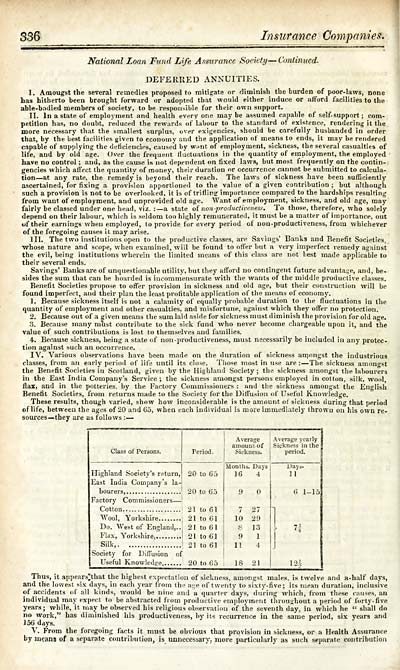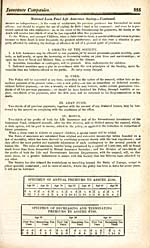Download files
Complete book:
Individual page:
Thumbnail gallery: Grid view | List view

sse
Insurance Companies.
National Loan Fund Life Assurance Society — Continued.
DEFERRED ANNUITIES.
I. Amougst the several remedies proposed to mitigate or diminish the burden of poor-laws, none
has hitherto been brought forward or adopted that would either induce or afford facilities to the
able-bodied members of society, to be responsible for their own support.
II. In a state of employment and health every one may be assumed capable of self-support ; com-
petition has, no doubt, reduced the rewards of labour to the standard of existence, rendering it the
more necessary that the smallest surplus, over exigencies, should be carefully husbanded in order
that, by the best facilities given to economy and the application of means to ends, it may be rendered
capable of supplying the deficiencies, caused by wnnt of employment, sickness, the several casualties of
life, and by old age. Over the frequent fluctuations in the quantity of employment, the employed
have no control ; and, as the cause is not dependent on fixed laws, but most frequently on the contin-
gencies which affect the quantity of money, their duration or occurrence cannot be submitted to calcula-
tion — at any rate, the remedy is beyond their reach. The laws of sickness have been sufficiently
ascertained, for fixing a provision apportioned to the value of a given contribution ; but although
such a provision is not to be overlooked, it is of triflinff importance compared to the hardships resulting
from want of employment, and unprovided old age. Want of employment, sickness, and old age, may
fairly be classed under one head, viz. : — a state oi non-productiveness. To those, therefore, who solely
depend on their labour, which is seldom too highly remunerated, it must be a matter of importance, out
of their earnings when employed, to provide for every period of non-productiveness, from whichever
of the foregoing causes it may arise.
III. The two institutions open to the productive classes, are Savings' Banks and Benefit Societies^
■whose nature and scope, when examined, will be found to offer but a very imperfect remedy against
the evil, being institutions wherein the limited means of this class are not best made applicable to
their several ends.
Savings' Banks are of unquestionable utility, but they afford no contingent future advantage, and, be-
sides the sum that can be hoarded is incommensurate with the wants of the middle productive classes.
Benefit Societies propose to offer provision in sickness and old age, but their construction will be
found imperfect, and their plan the least profitable application of the means of economy.
1. Because sickness itself is not a calamity of equally probable duration to the fluctuations in the
quantity of employment and other casualties, and misfortune, against which they offer no protection.
2. Because out of a given means the sum laid aside for sickness must diminish the provision for old age.
3. Because many must contribute to the sick fund ■who never become chargeable upon it, and the
value of such contributions is lost to themselves and families.
4. Because sickness, being a state of non-productiveness, must necessarily be included in any protec-
tion against such an occurrence.
IV. Various observations have been made on the duration of sickness atnongst the industrious
classes, from an early period of life until its close. Those most in use are : — The sickness amongst
the Benefit Societies in Scotland, given by the Highland Society ; the sickness amongst the labourers
in the East India Company's Service ; the sickness amongst persons employed in cotton, silk, \voi)l,
flax, and in the potteries, by the Factory Commissioners ; and the sickness amongst the EnclisU
Benefit Societies, from returns made to the Society for the Diffusion of Useful Knowledge.
These results, though varied, show how inconsiderable is the amount of sickness during that period
of life, between the ages of 20 and 65, when each individual is more immediatelj' thrown on his own re-
sources — they are as follows :-—
Average ! Average yearly
amount of I Sickness in the
Sickness. period.
20 to 65
20 to 65
Highland Society's return.
East India Company's la-
bourers,
Factory Commissioners —
Cotton : 21 to 61
Wool, Yorkshire ; 21 to 61
Do. West of England,.., 21 to 61
Flax, Yorkshire, 21 to 61
Silk, \ 21 to 61
Society for Diffusion of
Useful Knowledge, 20 to 65
Months. Days )
16 4
9
18 21
Days
11
6 1-15!
\ n
l-2i
Thus, it appears'that the highest expectation of sickness, amongst males, is twelve and a-half days,
and the lowest six days, in each year from the asje of twenty to sixty-five; its mean duration, inclusive
of accidents of all kinds, would be nine and a quarter days, daring which, from these causes, an
individual may expect to be abstracted fiom productive employment throughout a period of forty-five
years; while, it may be observed his religious observation of the seventh day, in which he " shall do
no work," has diminished his productiveness, by its recurrence in the same period, six years and
156 days.
V. From the foregoing facts it must be obvious that provision in sickness, or a Health Assurance
by means of a separate contribution, is unnecessary, more particularly as such separate contribution
Insurance Companies.
National Loan Fund Life Assurance Society — Continued.
DEFERRED ANNUITIES.
I. Amougst the several remedies proposed to mitigate or diminish the burden of poor-laws, none
has hitherto been brought forward or adopted that would either induce or afford facilities to the
able-bodied members of society, to be responsible for their own support.
II. In a state of employment and health every one may be assumed capable of self-support ; com-
petition has, no doubt, reduced the rewards of labour to the standard of existence, rendering it the
more necessary that the smallest surplus, over exigencies, should be carefully husbanded in order
that, by the best facilities given to economy and the application of means to ends, it may be rendered
capable of supplying the deficiencies, caused by wnnt of employment, sickness, the several casualties of
life, and by old age. Over the frequent fluctuations in the quantity of employment, the employed
have no control ; and, as the cause is not dependent on fixed laws, but most frequently on the contin-
gencies which affect the quantity of money, their duration or occurrence cannot be submitted to calcula-
tion — at any rate, the remedy is beyond their reach. The laws of sickness have been sufficiently
ascertained, for fixing a provision apportioned to the value of a given contribution ; but although
such a provision is not to be overlooked, it is of triflinff importance compared to the hardships resulting
from want of employment, and unprovided old age. Want of employment, sickness, and old age, may
fairly be classed under one head, viz. : — a state oi non-productiveness. To those, therefore, who solely
depend on their labour, which is seldom too highly remunerated, it must be a matter of importance, out
of their earnings when employed, to provide for every period of non-productiveness, from whichever
of the foregoing causes it may arise.
III. The two institutions open to the productive classes, are Savings' Banks and Benefit Societies^
■whose nature and scope, when examined, will be found to offer but a very imperfect remedy against
the evil, being institutions wherein the limited means of this class are not best made applicable to
their several ends.
Savings' Banks are of unquestionable utility, but they afford no contingent future advantage, and, be-
sides the sum that can be hoarded is incommensurate with the wants of the middle productive classes.
Benefit Societies propose to offer provision in sickness and old age, but their construction will be
found imperfect, and their plan the least profitable application of the means of economy.
1. Because sickness itself is not a calamity of equally probable duration to the fluctuations in the
quantity of employment and other casualties, and misfortune, against which they offer no protection.
2. Because out of a given means the sum laid aside for sickness must diminish the provision for old age.
3. Because many must contribute to the sick fund ■who never become chargeable upon it, and the
value of such contributions is lost to themselves and families.
4. Because sickness, being a state of non-productiveness, must necessarily be included in any protec-
tion against such an occurrence.
IV. Various observations have been made on the duration of sickness atnongst the industrious
classes, from an early period of life until its close. Those most in use are : — The sickness amongst
the Benefit Societies in Scotland, given by the Highland Society ; the sickness amongst the labourers
in the East India Company's Service ; the sickness amongst persons employed in cotton, silk, \voi)l,
flax, and in the potteries, by the Factory Commissioners ; and the sickness amongst the EnclisU
Benefit Societies, from returns made to the Society for the Diffusion of Useful Knowledge.
These results, though varied, show how inconsiderable is the amount of sickness during that period
of life, between the ages of 20 and 65, when each individual is more immediatelj' thrown on his own re-
sources — they are as follows :-—
Average ! Average yearly
amount of I Sickness in the
Sickness. period.
20 to 65
20 to 65
Highland Society's return.
East India Company's la-
bourers,
Factory Commissioners —
Cotton : 21 to 61
Wool, Yorkshire ; 21 to 61
Do. West of England,.., 21 to 61
Flax, Yorkshire, 21 to 61
Silk, \ 21 to 61
Society for Diffusion of
Useful Knowledge, 20 to 65
Months. Days )
16 4
9
18 21
Days
11
6 1-15!
\ n
l-2i
Thus, it appears'that the highest expectation of sickness, amongst males, is twelve and a-half days,
and the lowest six days, in each year from the asje of twenty to sixty-five; its mean duration, inclusive
of accidents of all kinds, would be nine and a quarter days, daring which, from these causes, an
individual may expect to be abstracted fiom productive employment throughout a period of forty-five
years; while, it may be observed his religious observation of the seventh day, in which he " shall do
no work," has diminished his productiveness, by its recurrence in the same period, six years and
156 days.
V. From the foregoing facts it must be obvious that provision in sickness, or a Health Assurance
by means of a separate contribution, is unnecessary, more particularly as such separate contribution
Set display mode to: Large image | Transcription
Images and transcriptions on this page, including medium image downloads, may be used under the Creative Commons Attribution 4.0 International Licence unless otherwise stated. ![]()
| Scottish Post Office Directories > Towns > Edinburgh > Post-Office annual directory and calendar > 1838-39 > (376) |
|---|
| Permanent URL | https://digital.nls.uk/83035506 |
|---|
| Description | Directories of individual Scottish towns and their suburbs. |
|---|
| Description | Around 700 Scottish directories published annually by the Post Office or private publishers between 1773 and 1911. Most of Scotland covered, with a focus on Edinburgh, Glasgow, Dundee and Aberdeen. Most volumes include a general directory (A-Z by surname), street directory (A-Z by street) and trade directory (A-Z by trade). |
|---|


